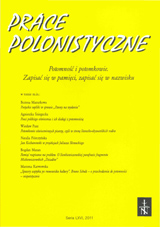Czy rewolucja musi pożreć swoje dzieci? Wybrane aspekty antyrewolucyjnego światopoglądu Wacława Grubińskiego (na przykładzie komedii „Lenin”)
Does revolution have to devour its own children? Selected aspects of Waclaw Grubinski’s antirevolutionary worldview (based on the comedy ”Lenin”)
Author(s): Joanna RaźnySubject(s): Literary Texts
Published by: Łódzkie Towarzystwo Naukowe
Summary/Abstract: Ideas included in the article concentrate on Waclaw Grubinski’s comedy Lenin (1921). The book which is one of the first attempts of the analysis of revolutionary dictatorship in Russia. Both historical background and elements of the world presented in the book, creating the picture of the Soviet Russia as a land of civilizing regression and social enslavement have been broadly discussed in the article. Much attention has been drawn to the main hero who, being presented as following arbitrary views ideologist, transforms the revolution into its contradiction — tyranny. Placing the drama in the broader context of Grubinski’s essay and reminiscent prose reveals selected aspects of his antrevolutionary worldview. (The author was the prisoner of Soviet gulag in 1941–42). Affirmative attitude towards tradition and respect for previous generations’ achievements are the source of his worldview. In the last part of the article propaganda undertone of the book, which was caused by patriotic atmosphere of 1920 and glorification of the history making power of the „miracle at Vistula”, is indicated. Moreover the attempt of specifying the book’s position in Polish revolutionary drama tradition has been made.
Journal: Prace Polonistyczne
- Issue Year: 2011
- Issue No: 66
- Page Range: 253-271
- Page Count: 19
- Language: Polish

